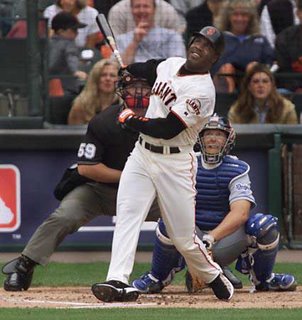
Repeat after me: Barry Bonds said "I never knowingly took a banned substance" ; Barry Bonds said "I never knowingly took a banned substance." ; Barry Bonds said "I never knowingly took a banned substance."
Ok. Now, how many times does he have to say that? Apparently not enough for the San Francisco Chronicle. In a book to be released on March 21st, two Chron writers, Mark Fainaru-Wada and Lance Williams, claim that 200 sources "saw" Bonds take a banned substance, a form of steroid starting in 1998.
The San Francisco Bay Area sports media -- well populated with haters of the San Francisco Giants' premier slugger -- was quick to jump on the Chron's story, so quick that their brains shut off in the process. The people hot to lock up Barry Bonds apparently scored "six" on their Wonderlic tests -- and that exam applies more to what journalists do than the tasks of NFL quarterbacks.
But I digress.
The San Francisco Chronicle, in its lustful zeal to lynch a man that some Bay Area media types have branded as "arrogant" and basically a combination of adjectives that add up to "Uppity Negro," didn't even bother to use the term "allegedly." Nope. They just plain out and out wrote this:
Barry Bonds began using steroids after the 1998 baseball season and came to rely on a wide variety of performance-enhancing drugs over the next several years, according to a book written by two Chronicle reporters and excerpted in this week's Sports Illustrated.
The impication of this opening paragraph of today's Chronicle article is that everything Barry took was not legal at the time. Moreover, the Chronicle drunkenly uses the term "performance-enhancing drugs" as if that's a bad thing. Hey, in that case, you'd better lock me up for the four vitamin pills I took today.
I swear it's work like this that makes me wonder if some writers take the sauces before they write, rather than after they've written. And regardless of what the writer tells you, the sauce is not a performance-enhancing drug, but it can certainly cause one to write that Barry Bonds was knowingly using them, when they should have used more careful prose.
Here are the facts.
In 2002, San Diego Padres Ken Caminiti told Sports Illustrated that in 1996, not only was he using steroids, but half the players in Major League Baseball. Apparently, Bonds, who reportedly started using steroids in 1998, got the memo two years late, but even then the substances that were being provided were not illegal.
Indeed, it wasn't until 2004 that Major League Baseball placed a ban on the use of any drug that could be a steroid.
But the point is that -- repeat after me -- Barry Bonds said "I never knowingly took a banned substance." Again, Barry Bonds said "I never knowingly took a banned substance."
Are you listening?
This entire affair reads more like an attempt to defame Barry Bonds. I mean, why do I need to know that the drugs Bonds took which he did not know to be illegal have caused him to suffer sexual dysfunction and lead to his supposedly terrible behavior?
In other words, it's really important I know the brother's pissed cause he can't get it up. How in the heck do they know that, and why should I be aware of this news? It reads as if the Chron's trying to help Bonds' mistress stick it to him, and I'm not talking about a needle, either.
What's the point? If it's meaness, then Phil Bronstein's boys have hit the mark.
Look, I'm sure Barry was no different than "half the players in Major League Baseball" but where Mark McQuire gets away with a clean image (drug use allegations don't stick to him, even though Jose Canseco says McQuire used them), here comes the Chronicle to make sure dirt's kicked in Barry's face.
I have a feeling egg's going to be on the face of the Chronicle. Williams says that "I think it's important for baseball to corral performance-enhancing drugs and not tolerate them, because the tolerance for those drugs will inevitably seep down into the colleges and the prep programs. We're already seeing it," in response to why this story's important. That's a load of bull; the story's important because it's the latest bazooka they're using to embarrass Barry Bonds.
Look, Barry's not perfect. Fine. But he's a great baseball player. As far as I'm concerned, and other fans too, I'll still root for Barry, and pray that the San Francisco Chronicle gets a perfomance-enhanced kick in the collective ass.






